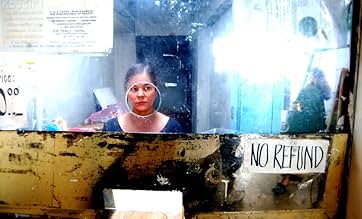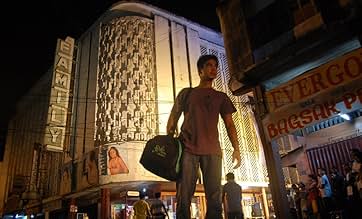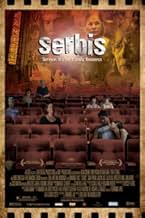Serbis
IMDb RATING
6.1/10
2K
YOUR RATING
The Pineda family struggles with bigamy, unwanted pregnancy, possible incest, and skin irritations in a dilapidated movie theater.The Pineda family struggles with bigamy, unwanted pregnancy, possible incest, and skin irritations in a dilapidated movie theater.The Pineda family struggles with bigamy, unwanted pregnancy, possible incest, and skin irritations in a dilapidated movie theater.
- Awards
- 9 wins & 15 nominations total
Kristoffer King
- Ronald
- (as Kristofer King)
Dido de la Paz
- Atty. Quintana
- (as Dido Dela Paz)
Buddy Caramat
- Tonette
- (as Buddy Salvador Caramat)
Aaron Rivera
- Ricky
- (as Aaron Christian Rivera)
Featured reviews
This film challenges the actors to portray their characters realistically. The story revolves around them and there is no clear climax. Rather, it is a cacophony of events plotting the life of this family living in a run-down theater. They are barely subsistent.
I have a sense of having watched a play because the entire scene takes place in the theater. Camera techniques and lighting has been well placed that it draws the emotion and atmosphere accurately. The use of hand held technique and the background noise gives emphasis to the chaos and discordant lives that is.
Being a low-budget independent film, demonstrates to us that a good movie can be achieved and interpreted such as "SERBIS".
I have a sense of having watched a play because the entire scene takes place in the theater. Camera techniques and lighting has been well placed that it draws the emotion and atmosphere accurately. The use of hand held technique and the background noise gives emphasis to the chaos and discordant lives that is.
Being a low-budget independent film, demonstrates to us that a good movie can be achieved and interpreted such as "SERBIS".
A dilapidated Filipino movie theater is the star of this film, but it's not a dark, haunted place like the cinema of Tsai Ming-liang's austere Goodbye, Dragon Inn. Located in the city of Angeles in the Philippines, this one, only partly ironically called "Family," is active, in fact overactive, and holes in walls leave it open to invasions from goats and its lower floor is exposed to the noises of a busy street crammed with pedestrians, motorcycles, cars, and trucks at all hours.
Serbis shows heterosexual porn movies all day long while numerous gay hustlers ply their trade for the pleasure of older gay men, performing fellatio or having it performed on them in the seats and in the back of the big auditorium. "Serbis" means "service" and is the rallying cry of the gay rent boys. The theater is run by the Pineda family, who come and go, they live upstairs, they run a fast food restaurant on the ground floor, and they deal with such personal problems as bigamy, unwanted pregnancy, possible incest, and a boil on an attractive young male bum. This film, which includes clips of the porno, live sex involving the family and the in-house prostitutes, is Mendoza's seventh feature film and was an official selection of the 2008 Festival de Cannes.
Events happen on a "Wednesday (the day for the novena to the Mother of Perpetual Help) in October (month-long feast of Our Lady of the Rosary)"--I'm quoting from the distributor's material. The rather regal Nanay Flor (Gina Pareno) has filed a bigamy case against her estranged husband Tatay Edwinand goes to court to see the years-long case finally decided. Alan (Coco Martin) is a young man upstairs who paints busty nudes on the wall; he's the one who has a boil on his bum. He has sex with his girlfriend Merly (Mercedes Cabral) and has just learned to his dismay that she is pregnant. Nayda (Jacky Jose), who mans the theater while Nanay For is at court, is married but drawn to her cousin Ronald, who is also in the building. She sees to having the right movie posters up, and argues with her husband, Lando, on the phone, because Mr. El Lobo, the soft drink distributor, has to be paid. Lando (Julio Diaz) mans the little restaurant, not always successfully; a young man cheats him out of 30 pesos and he can't get it back. There is another brother, Ronald (Kristopher King). There's also a little bespectacled schoolboy, Jonas, who's good in math. The things he sees! Nanay Flor says that they had three theaters, but have had to close the other two because they weren't making money, and this one is failing.
Nanay Flor loses the case, and to her disappointment her youngest son, Jerome (Dan Alvaro) testifies against her. She is further distressed to learn that the film rentals are going up. Serbis is replete with actual details of this kind, and even shows Alan delivering reels to a bus and picking up the new ones for the week.
Excitement happens when a purse-snatcher tries to take refuge in the theater but customers, the family, and cops all chase him. The lights go on exposing the many "serbis" boys 'in flagrante.' When the thief is caught the lights go down, the film resumes, and the "serbis" boys are back to work. At another point a small white goat has escaped into the theater and appears just below the screen. Another chase. To recover from her horrible day, Nanay Flor takes a bath in the shoddy bathroom (the Gent's is flooded), grooms herself and dresses in black, and goes down to the ticket window facing out, ready for anything.
After symbolically popping his boil, Alan has impulsively packed a bag and run away. way.
Carlo Tabije and Benjamin Padero deserve notice for their set designs (the field in which Mendoza got his start); Odyssey Flores' cinematography is rough at times, but effective. The processing gives the images too edgy a look at times. The lighting isn't bad, but there is way too much street noise, and those who argue the whole production is exploitive and crude aren't far off the mark, but the depiction of a family isn't without interest, though this has none of the poetry and mood of other films about the devolution of a place.
This is as if a Third World 'telenovela,' with X-rated sex added, was all crammed into a single comprehensive 90-minute episode. It's an impressive achievement, but a little bit indigestible. Mendoza's earlier film 'Foster Child' received an ovation at the previous Cannes festival. He has produced something sui generis this time and it would appear that there is life in the Filipino film industry.
Serbis shows heterosexual porn movies all day long while numerous gay hustlers ply their trade for the pleasure of older gay men, performing fellatio or having it performed on them in the seats and in the back of the big auditorium. "Serbis" means "service" and is the rallying cry of the gay rent boys. The theater is run by the Pineda family, who come and go, they live upstairs, they run a fast food restaurant on the ground floor, and they deal with such personal problems as bigamy, unwanted pregnancy, possible incest, and a boil on an attractive young male bum. This film, which includes clips of the porno, live sex involving the family and the in-house prostitutes, is Mendoza's seventh feature film and was an official selection of the 2008 Festival de Cannes.
Events happen on a "Wednesday (the day for the novena to the Mother of Perpetual Help) in October (month-long feast of Our Lady of the Rosary)"--I'm quoting from the distributor's material. The rather regal Nanay Flor (Gina Pareno) has filed a bigamy case against her estranged husband Tatay Edwinand goes to court to see the years-long case finally decided. Alan (Coco Martin) is a young man upstairs who paints busty nudes on the wall; he's the one who has a boil on his bum. He has sex with his girlfriend Merly (Mercedes Cabral) and has just learned to his dismay that she is pregnant. Nayda (Jacky Jose), who mans the theater while Nanay For is at court, is married but drawn to her cousin Ronald, who is also in the building. She sees to having the right movie posters up, and argues with her husband, Lando, on the phone, because Mr. El Lobo, the soft drink distributor, has to be paid. Lando (Julio Diaz) mans the little restaurant, not always successfully; a young man cheats him out of 30 pesos and he can't get it back. There is another brother, Ronald (Kristopher King). There's also a little bespectacled schoolboy, Jonas, who's good in math. The things he sees! Nanay Flor says that they had three theaters, but have had to close the other two because they weren't making money, and this one is failing.
Nanay Flor loses the case, and to her disappointment her youngest son, Jerome (Dan Alvaro) testifies against her. She is further distressed to learn that the film rentals are going up. Serbis is replete with actual details of this kind, and even shows Alan delivering reels to a bus and picking up the new ones for the week.
Excitement happens when a purse-snatcher tries to take refuge in the theater but customers, the family, and cops all chase him. The lights go on exposing the many "serbis" boys 'in flagrante.' When the thief is caught the lights go down, the film resumes, and the "serbis" boys are back to work. At another point a small white goat has escaped into the theater and appears just below the screen. Another chase. To recover from her horrible day, Nanay Flor takes a bath in the shoddy bathroom (the Gent's is flooded), grooms herself and dresses in black, and goes down to the ticket window facing out, ready for anything.
After symbolically popping his boil, Alan has impulsively packed a bag and run away. way.
Carlo Tabije and Benjamin Padero deserve notice for their set designs (the field in which Mendoza got his start); Odyssey Flores' cinematography is rough at times, but effective. The processing gives the images too edgy a look at times. The lighting isn't bad, but there is way too much street noise, and those who argue the whole production is exploitive and crude aren't far off the mark, but the depiction of a family isn't without interest, though this has none of the poetry and mood of other films about the devolution of a place.
This is as if a Third World 'telenovela,' with X-rated sex added, was all crammed into a single comprehensive 90-minute episode. It's an impressive achievement, but a little bit indigestible. Mendoza's earlier film 'Foster Child' received an ovation at the previous Cannes festival. He has produced something sui generis this time and it would appear that there is life in the Filipino film industry.
I watched this movie with my filipino wife, she knew a many actors from there. I like the older pinoy movies, however they are mostly depressive and about hard life, but probably since this is not so old movie, it was not so dark. With a little filipinou humour style, i liked it.
This is a film that has no cohesive narrative, really, it's more of a series of snapshots, if you will, of the lives that revolve on a ramshackle movie theater that can be considered as the star of this film, like a living breathing creature that it is, all with its operators and the patrons that frequent it, a place that had seen better days which nobody seems to clearly remember. Actually, only Nanay Flor, (played by Gina Pareño, an actress that in her heydays was quite a vamp) who's an embattled matriarch undergoing divorce proceedings with the unpresent patriarch, still manages to be unperturbed, feathers unruffled (a bravura performance), while others in the building just soldier on and are left just going through the motions. Despite the progress of technology where people can easily find pornographic content on the Internet during the decade of the noughts when this film is set, it still remains but a stubborn bastion of sleaze with its sieve-like fortifications, everybody or anything can get in and out of it in the middle of a noisy city. Noise pollution be damned (at least I could just read the subtitles like other non-Filipino speakers). Such cacophony of sounds, though the unacquainted might find that to be a bit overwhelming, has a higher purpose and it doesn't even matter much whether that was coincidental or contrived. So it is best tho have that immersive mindset as one watches this.
Living in the same country where this film is set, I'm one of those people (though definitely not well-off) fortunate enough to have had my first experience watching cinema alone in my mid-teens in one of those up-scale mall multiplexes, and still does so occassionally to this day, which at the time I'm writing this, that viewing experience is in itself in a state of quandary as streaming services looms to replace the film viewing habits of people globally. Though cannot be considered that bad but it's also not that good either, imho, because I find theaters have that certain charm, and though at times they have their own fair share of annoying co-patrons to deal with amongst other things, the overall experience tend to be on the kinder side.
An evocation of such nostalgia brings to mind the films like Tsai Ming Liang's Goodbye, Dragon Inn or Giuseppe Tornatore's Oscar-winner Cinema Paradiso, their love-letter to cinema both set in the theater space which does not shy away from detailing the seamier side of those experiences. But what we witness in Brilliante Mendoza's socio-realist masterpiece is that there is no energy to spare when it comes to sharing the mawkishness that that the Family Theater matron in the film have manifested. He instead went in and goes straight for the jugular, hastily sending subtlety to vacation to showcase the yuck factor in these kinds of places instead. And one just need and look at the film titles on offer that the theater exhibits. The poor uncouth masses subjected to the indignities of having to endure such filthy places just to ply their wares, in a place where the lower class people's only form of sporting entertainment are catered by these establishments, especially during the pre-Internet era. But a welcome escapism from such bleak narrative was the goat scene which is, like, the best live-action animal cameo I've seen done in the whole of world cinema ever (G.O.A.T., right?), even beats the rooster/chicken chase in Fernando Meirelles' City of God. The gracefulness of that animal as it scampered down that staircase centerpiece was just heavenly hilarious. Unfortunately, that is the only elegant treat in store for this film.
But as for Brilliante Mendoza's reputation as a filmmaker, I feel this has definitely cemented his place as a significant voice in the Philippine film industry. Though I was initially disappointed, having watched Kinatay before this, a film that I felt that something was quite lacking as I watched that one in full, I was left kind of dumbfounded as to what the hoopla surrounded Mendoza receiving that directorial accolade at Cannes. But only after watching this film that immediately preceded it, the more clearer it became to me what reflected their decision to give him those honors, and I couldn't agree more now. The dilapidated chic aesthetic of those two films, I dare say, go well together and should be seen as a double-bill feature instead because the director encapsulated all that needs to said without saying much with those two films he made back-to-back, providing the best way of presenting people who the people living in the Philippines really are, which is a quite very courageous statement.
So this film definitely functions as a quasi-document to express the lament of the silenced masses who have just resigned to their predicament, people that have no other way to voice out their despair, those of whom who don't have any more tears left to shed. Mendoza and his crew has facilitated that for them. So even if the passage of time inevitably replace of those dilapidated structures, at least the likes of me, we have this. Numquam obliviscar.
Rating: (A beta-plus).
Living in the same country where this film is set, I'm one of those people (though definitely not well-off) fortunate enough to have had my first experience watching cinema alone in my mid-teens in one of those up-scale mall multiplexes, and still does so occassionally to this day, which at the time I'm writing this, that viewing experience is in itself in a state of quandary as streaming services looms to replace the film viewing habits of people globally. Though cannot be considered that bad but it's also not that good either, imho, because I find theaters have that certain charm, and though at times they have their own fair share of annoying co-patrons to deal with amongst other things, the overall experience tend to be on the kinder side.
An evocation of such nostalgia brings to mind the films like Tsai Ming Liang's Goodbye, Dragon Inn or Giuseppe Tornatore's Oscar-winner Cinema Paradiso, their love-letter to cinema both set in the theater space which does not shy away from detailing the seamier side of those experiences. But what we witness in Brilliante Mendoza's socio-realist masterpiece is that there is no energy to spare when it comes to sharing the mawkishness that that the Family Theater matron in the film have manifested. He instead went in and goes straight for the jugular, hastily sending subtlety to vacation to showcase the yuck factor in these kinds of places instead. And one just need and look at the film titles on offer that the theater exhibits. The poor uncouth masses subjected to the indignities of having to endure such filthy places just to ply their wares, in a place where the lower class people's only form of sporting entertainment are catered by these establishments, especially during the pre-Internet era. But a welcome escapism from such bleak narrative was the goat scene which is, like, the best live-action animal cameo I've seen done in the whole of world cinema ever (G.O.A.T., right?), even beats the rooster/chicken chase in Fernando Meirelles' City of God. The gracefulness of that animal as it scampered down that staircase centerpiece was just heavenly hilarious. Unfortunately, that is the only elegant treat in store for this film.
But as for Brilliante Mendoza's reputation as a filmmaker, I feel this has definitely cemented his place as a significant voice in the Philippine film industry. Though I was initially disappointed, having watched Kinatay before this, a film that I felt that something was quite lacking as I watched that one in full, I was left kind of dumbfounded as to what the hoopla surrounded Mendoza receiving that directorial accolade at Cannes. But only after watching this film that immediately preceded it, the more clearer it became to me what reflected their decision to give him those honors, and I couldn't agree more now. The dilapidated chic aesthetic of those two films, I dare say, go well together and should be seen as a double-bill feature instead because the director encapsulated all that needs to said without saying much with those two films he made back-to-back, providing the best way of presenting people who the people living in the Philippines really are, which is a quite very courageous statement.
So this film definitely functions as a quasi-document to express the lament of the silenced masses who have just resigned to their predicament, people that have no other way to voice out their despair, those of whom who don't have any more tears left to shed. Mendoza and his crew has facilitated that for them. So even if the passage of time inevitably replace of those dilapidated structures, at least the likes of me, we have this. Numquam obliviscar.
Rating: (A beta-plus).
This is just the type of theater that one would expect to see certain politicians in the corner hiding from the press and their constituents. It is a seedy gay theater that shows heterosexual soft core porn films.
We go up and down the stairs of this theater as the family that runs it plays out their lives. Director Brillante Mendoza won a few awards, including a Golden Palm nomination.
Jacklyn Jose was very good as the daughter who keeps things going. She also has a very cute kid (Bobby Jerome Go). Gina Pareño won an Asian Film Award for her role as the matriarch who is trying to get rid of her philandering husband. Meanwhile, Alan's (Coco Martin) girlfriend (Mercedes Cabral) is pregnant, inspiring more drama and yelling. All of this occurs as they struggle to keep the last of three movie houses from going bankrupt.
The ending is pretty anticlimactic and I really didn't see it coming.
We go up and down the stairs of this theater as the family that runs it plays out their lives. Director Brillante Mendoza won a few awards, including a Golden Palm nomination.
Jacklyn Jose was very good as the daughter who keeps things going. She also has a very cute kid (Bobby Jerome Go). Gina Pareño won an Asian Film Award for her role as the matriarch who is trying to get rid of her philandering husband. Meanwhile, Alan's (Coco Martin) girlfriend (Mercedes Cabral) is pregnant, inspiring more drama and yelling. All of this occurs as they struggle to keep the last of three movie houses from going bankrupt.
The ending is pretty anticlimactic and I really didn't see it coming.
Did you know
- TriviaDirector Brillante Mendoza revealed that the sex scene between Coco Martin and Mercedes Cabral was simulated. "It was assumed by everyone that in the sex scene there was real penetration. The actors knew how I work, and if they were on a different level of their profession, they probably would have had real sex. But since this was the girl's first film and she's from a conservative family, she had done enough, so there is no penetration. But I wanted people to believe there was actual sexual intercourse, and it was so realistic that people believe that's what happened," he explained.
- Quotes
Nanay Flor: How could you let this idiot impregnate you?
- ConnectionsFeatured in Logos de Partout dans le Monde: Philippines (2016)
- How long is Service?Powered by Alexa
Details
- Release date
- Countries of origin
- Official site
- Languages
- Also known as
- Service
- Filming locations
- Production companies
- See more company credits at IMDbPro
Box office
- Gross US & Canada
- $64,536
- Opening weekend US & Canada
- $12,824
- Feb 1, 2009
- Gross worldwide
- $155,156
Contribute to this page
Suggest an edit or add missing content






























